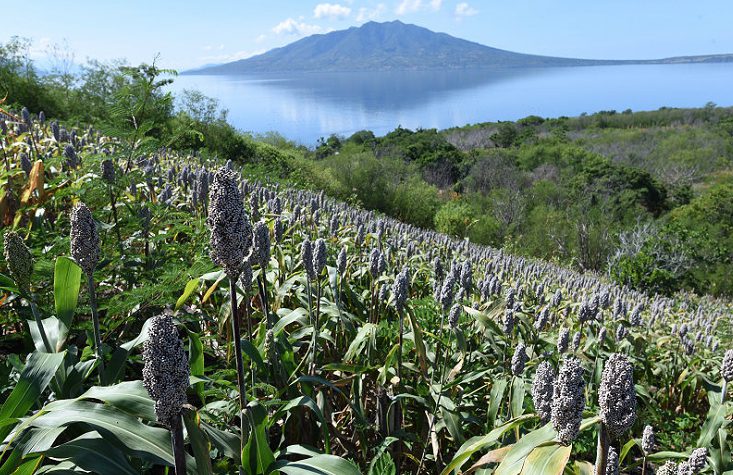Strengthening Food Security, West Manggarai Revitalizes Sorgum

-
Date:
30 Apr 2020 -
Author:
KEHATI
DATE: 26 Mar 2018
AUTHOR: KEHATI
West Manggarai Regency, East Nusa Tenggara, is determined to revitalize sorghum as a source of food to strengthen food security. In the past, sorghum was the main carbohydrate source of Manggarai residents, but in the last few years the condition has been shifted.
As part of a step towards realizing that idea, the farmers who are members of the Lembor Farmers Association (APEL) held a sorghum Great Harvest Day which was centred in Pocokoe Village, Ngancar Village, Lembor District, on Saturday 3 March 2018. The harvest was attended by the Regent of Manggarai Barat Agustinus CH Dula and Deputy Regent Maria Geyong, accompanied by seven chief of local government agencies, as well as representatives of the Indonesian Biodiversity Foundation (KEHATI) as institutions that assist APEL in the cultivation of sorghum in the area.
“This is a revolution. Where, we see ourselves the sorghum harvest in the field. Therefore, I inaugurated Ngancar Village as a sorghum village, “Agustinus said.
In the future, continued Agustinus, West Manggarai Regency Government will pay special attention to the development of sorghum in Lembor District. This is an effort to restore sorghum as a staple food as well as for strengthening local food security.
The same thing was also stated by the Head of the West Manggarai Agriculture Office, Anggalinus Apul. In an effort to maintain national, regional food security, independence and sovereignty, local food development such as sorghum will continue to be promoted in Manggarai Regency which has a lot of dry land, which is very suitable for the cultivation of these plants.
“I appreciate this APEL effort. West Manggarai Agriculture Office in 2019 will program the development of 50 hectares of sorghum, “said Anggalinus.
Endangered
Sorghum or locally known as mesak, is almost extinct in West Manggarai because it is no longer cultivated and consumed by the community. The influx on types of staple foods from outside, such as rice, shifts the existence of sorghum as a local staple food. In fact, this plant used to be the main source of carbohydrates consumed by people in this district and many regions in NTT.
Since 2013, farmers who are members of APEL, with support from the KEHATI Foundation, replant sorghum in yards, gardens and marginal or idle land in Pocokoe, Raminara, Sambir Lalong, and rice fields around Munting and Leweng in Lembor and Kecamatan South Lembor.
At the end of 2017, with the support of the KEHATI Foundation and PT HINO Motor Indonesia, farmers again planted their land with sorghum, which was centred in Pocokoe, Ngancar Village and Sambir Lalong.
“There are six types of sorghum that have been planted, namely sweet sorghum with tall red, yellow and black stems. Then, a short sorghum type cauldron and numbu. In addition, bamboo seed reproduction is also carried out with a cocoon system for land conservation,” explained Benedictus Pambur, Chair of the APEL Group.
There are more than 30 active members who plant sorghum with an area of 15 hectares. They formed a pioneering joint venture for the group’s economic activities.
Local Food Corridor Movement
The KEHATI Agriculture Ecosystem Manager, Puji Sumedi, said that the sorghum planting activity carried out in Lembor was one of the efforts to preserve local food sources in the dry land areas of mainland Flores, Lembata, Solor and Adonara. This is part of the implementation of the Local Food Corridor Movement in Flores, in the form of cultivation and post-harvest processing.
“KEHATI is working with a group of local farmers who are members of the Flores Local Food Association chaired by Maria Loretha to re-preserve food sources of sorghum carbohydrates that are diverse, nutritious, and good for health, and provide economic improvement for local farmers,” said Puji.
On the same occasion, the Director of Communications and Fundraising of KEHATI, Fardila Astari, said that in the Local Food Corridor Movement in Flores, KEHATI involved a number of stakeholders, both private, government, research institutes, and universities.
“The revitalization of sorghum is not only to strengthen food security, but also as an effort to preserve the biodiversity of the archipelago. This effort is a shared responsibility. Therefore, to achieve it, KEHATI cooperates with various parties and stakeholders, “said Fardila.
HINO Motor Indonesia Executive General Manager Bagas Krishnamurti, added, the company’s support in the planting of sorghum replanting in Flores is a form of concern for the development of community independence in NTT through a corporate social responsibility (CSR) program. The step is also to show support to the government in the success of the movement of food diversification based on local food and conservation of land with bamboo.
“It turns out that sorghum grows well, with very satisfying yields on dry land. Our initial target is 10 hectares, and the result is now 15 hectares, “said Bagas.
